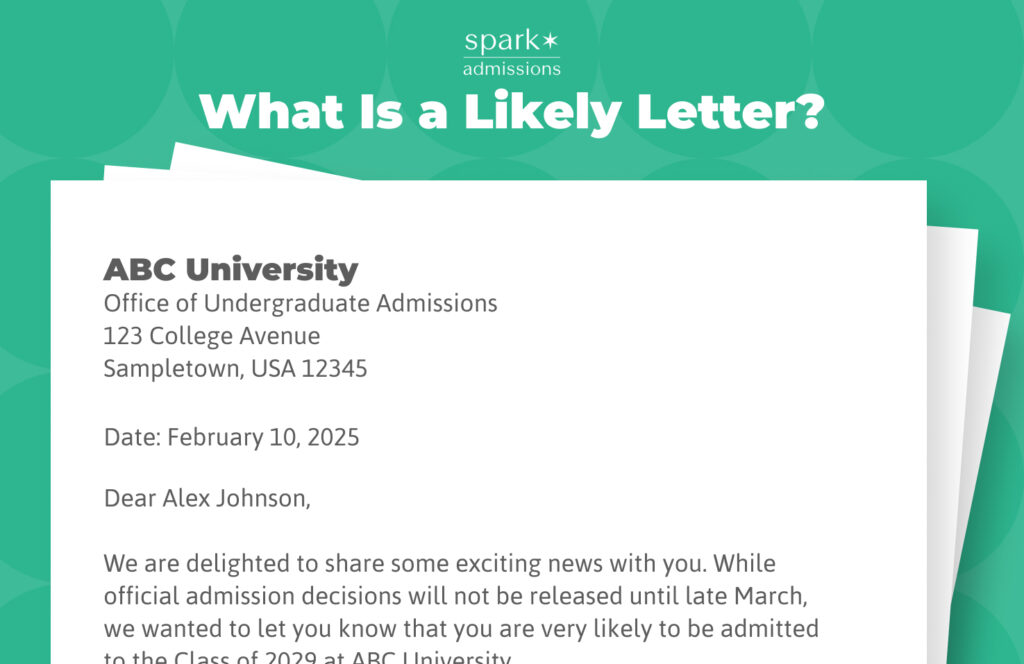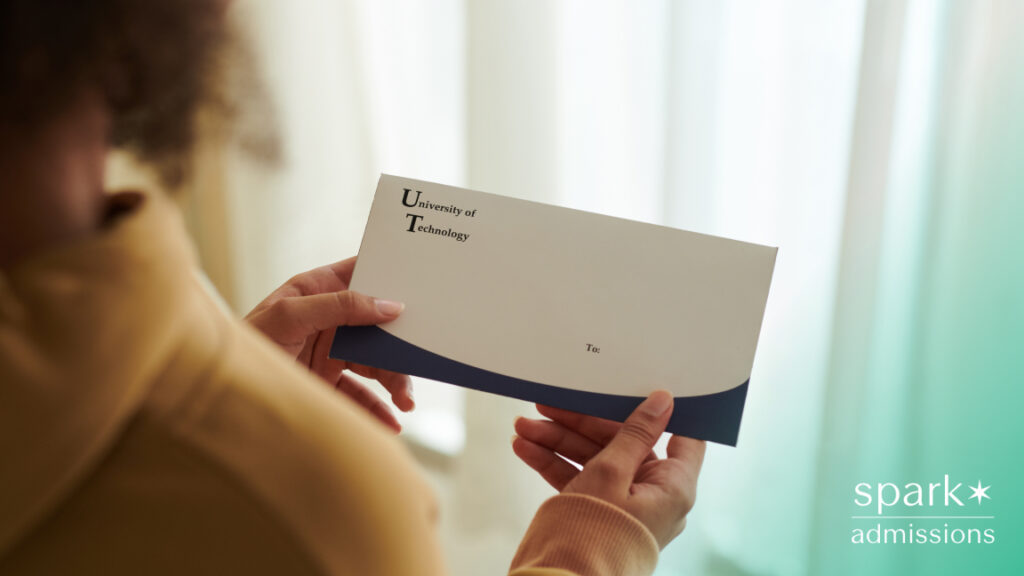- Blog
- > College Admissions
What Is a Likely Letter? A Guide for Top Applicants
- Dr. Rachel Rubin
- | August 18, 2025

For high-achieving college applicants, few moments are as exciting or as mysterious as receiving a likely letter from a prestigious university. If you’ve been navigating the intense college admissions process, you may have heard rumors about these early notices sent to select students before official decisions are released. But what exactly is a likely letter, who receives them, and what does it mean for your admission status?
In this guide, we’ll explain the purpose and impact of likely letters, share examples from Ivy League and other Top 50 schools, and help you understand how they fit into the broader context of your college application journey.

What Is a Likely Letter?
A likely letter is an early communication sent by highly selective colleges, especially Ivy League schools and other elite colleges, to inform a student that they are very likely to receive an offer of admission when official decisions are released.
While a likely letter is not a formal offer of admission, it is a strong indication that the admissions committee views the student as one of their top applicants. These letters are usually sent in early March, ahead of the official decision release in late March or early April.
The wording of likely letters typically includes language like:
“While this is not an official acceptance letter, we are delighted to let you know that you are very likely to be admitted to our incoming class.”
Students who receive likely letters can feel confident that their final decision will be positive, barring any major changes in academic performance or conduct.
Why Do Colleges Send Likely Letters?
Selective colleges use likely letters to manage their yield rate, which is the percentage of admitted students who choose to enroll. Schools with the highest yield rates, like Harvard, Yale, and Stanford, aim to secure commitments from talented students who may be weighing multiple offers from other top institutions.
Sending a likely letter helps schools:
- Express early interest in a student
- Encourage that student to choose their school over others
- Begin building relationships before official decisions are announced
Because these colleges cannot send official acceptance letters until all decisions are finalized, likely letters offer a way to signal enthusiasm to their strongest applicants without violating admissions protocols.

Who Receives Likely Letters?
Likely letters are reserved for the outstanding applicants, those with top grades, test scores, compelling extracurricular activities, and exceptional personal qualities. These students often stand out in multiple ways, having received national academic awards, published their own research, and/or demonstrated unique leadership roles. Athletic recruitment also uses likely letters, although they follow a slightly different process.
Only a small percentage of applicants, usually less than 1% at Ivy League institutions, receive likely letters. While they’re a tremendous honor, not receiving one is not a bad sign. The vast majority of accepted students receive no early notice at all.
When Are Likely Letters Sent?
Likely letters are typically sent between early March and mid-March, several weeks ahead of the official college admissions notifications in late March or early April.
The timeline may vary slightly depending on the school and the applicant’s background. For example, recruited athletes often receive a likely letter as early as senior fall, while academic likely letters are generally sent after the Regular Decision deadline.
Which Schools Send Likely Letters?
Likely letters can help you take a sigh of relief instead of ruminating over the probability of acceptance. While not every college uses likely letters, many of the most selective schools in the U.S. do, including:
- Harvard University
- Yale University
- Columbia University
- Dartmouth College
- Stanford University
- University of Pennsylvania
- Cornell University
- Duke University
- University of Chicago
Some other Top 50 colleges may also send early communications with similar intent before announcing their final decision. Those notices are sometimes referred to as “early writes” or pre-read notifications.
It’s worth noting that not all schools publicize this practice. Many students only learn about likely letters sent to the strongest applicants through peers or online forums, making them feel even more exclusive.

What Should You Do If You Receive a Likely Letter?
If you’re fortunate enough to receive a likely letter, congratulations! It means you’re being recognized as one of the most desirable applicants in an extremely competitive pool.
Here are a few next steps:
- Continue to excel in your coursework. Your final decision can still depend on academic performance during the remainder of senior year.
- Stay in communication with admissions officers, especially if they invite you to campus events or yield-focused programs.
- Begin researching the school more deeply, particularly if you’re admitted to multiple undergraduate programs.
- Avoid assuming this guarantees admission to every school; other colleges may not send a likely letter even if they plan to admit you.
A likely letter may also provide early access to admitted student events or scholarship opportunities, so be sure to read it carefully.
What If You Don’t Receive a Likely Letter?
Most accepted students do not receive a likely letter. These communications are rare and typically used to court the most outstanding applicants or to fill strategic needs for enrollment.
Not receiving a likely letter doesn’t negatively affect your chances of acceptance. The official admissions decisions are still ahead, and your application will be considered in full. If you’re concerned or feeling discouraged, remember that college admissions are highly unpredictable, especially at Ivy League and other Top 50 schools. Focus on schools that recognize your potential and will support your growth.
Can You Get Rejected After Receiving a Likely Letter?
While a likely letter is a strong indicator that an offer of admission is coming, it’s important for applicants to understand that it is not a binding or official guarantee. Especially at Ivy League and other elite institutions, a likely letter is meant to reassure top applicants that they are among the strongest in the pool, but it still precedes the official acceptance.
Technically, yes, it is possible (though rare) to be rejected after receiving a likely letter. Most colleges reserve the right to rescind or alter admissions decisions if something significant changes in a student’s academic record or behavior. For example, a serious drop in grades, a disciplinary issue, or misrepresentation in the application could put a final decision at risk.
Likely Letters and the Big Picture
A likely letter is one of the strongest signals of potential acceptance you can receive. While it’s not a formal offer of admission, it reflects a school’s deep interest in enrolling you and offers early clarity in an otherwise stressful process. With a clear understanding of what a likely letter is, you’re better equipped to navigate the next steps in your college admissions journey.
At Spark Admissions, we routinely work with students who receive likely letters from top universities. Our individualized strategies are built to position each student as a standout candidate. Contact us to set up a meeting with a counselor and receive tailored advice.


